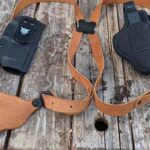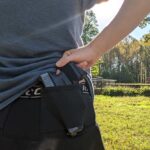Unlike firearms which require repeated maintenance, ammunition is pretty much left in storage until it’s time to load it up into a magazine. But, what is the ideal way to store ammunition? The best way to store ammunition is in a waterproof container with a desiccant pack to prevent corrosion. Whether stored loose or in factory ammo boxes, it should be kept in a cool dry area with a temperature of 68 degrees.
Table of Contents
How Long Will Properly Stored Ammo Last?
When stored properly, ammunition can last a very long time. I’ve read, and heard from, people who have used ammo well beyond the stated limits. However, ammunition and supply manufacturers generally say that properly stored ammo will last for 10 years.
As with most perishable items, I can only assume that this estimate is on the low to moderate end of the true shelf life for ammunition. Additionally, how long ammunition will keep for depends on the condition in which it was stored. If you leave a gallon of milk out in the sun it’s going to spoil much quicker than if you keep it in your fridge!
How To Organize Your Ammo For Storage

So what are the ideal conditions to store your ammunition? Before we get into the environmental details, lets talk about how to organize your ammo. For storing ammunition, I recommend grouping by caliber, pressure, bullet type, bullet weight and manufacturer.
Storing by caliber should make sense, because firearms are caliber dependent. Using the wrong caliber round in a gun can result in a very dangerous situation.
I personally don’t use +P ammunition, but if I did, I would be sure to separate over-pressured cartridges from my standard pressure rounds. Again, using over-pressured ammo in a gun not rated for it is unsafe.
Additionally, I organize my ammunition by bullet type to prevent unnecessarily wasting expensive personal defense ammo on the range. Therefore, I separate out my FMJ range ammo from the rest of my stock.
Finally, I sort my ammo by manufacturer. This is likely more a product of my OCD, but I have found that certain guns operate better with specific manufacturers. Another reason to sort ammo by manufacturer is for reporting purposes in case of malfunctions. But, I’ll cover that more in the next section.
Should You Store Ammo Loose Or In The Box?

There isn’t a need to dump factory ammunition out of the box it was shipped in. If you’re looking for economics of space, you can dump the ammunition and store it loose in an ammo can. However, do not touch the cartridges and follow the procedures for ammo storage temperatures and environmental conditions.
If you decide to store factory ammo loose in an ammo can, make sure to keep one of the labels from the factory boxes. The factory ammo box has important batch information that you can use on a report to the manufacturer should you experience malfunctions.
I keep all my reloaded ammo stored loose in an ammo can. However, I do this out of convenience and as part of my organizational habits. I label each can of reloads with case type, primer type, bullet grain, and grain manufacturer. If I ever experience multiple malfunctions with a batch of reloads I have all that information readily available for troubleshooting.
The Best Temperature To Store Ammunition
The oft cited answer to the best way to store ammunition is; “in a cool, dry place away from solvents, chemicals, heat sources, and open flames.” But what exactly does that mean?
The two main components of ammunition most likely to deteriorate in adverse conditions are the smokeless powder and the primer. If either of these components of the cartridge are compromised, you get no bang.
According to SAAMI, primers should not be exposed to temperatures above “150 degrees Fahrenheit.” However, powder is recommended to be stored at an even lower temperature. According to Vihtavouri, a leading manufacturer of gun powders, the recommended storage temperature of their powder is 68 degrees Fahrenheit.
Therefore, the best temperature to store ammunition would be 68 degrees. By storing ammunition at this temperature you are meeting the ideal conditions for both primers and powder.
Other Ammo Storage Considerations
Make no mistake, temperature isn’t the only threat to the longevity of your ammunition. Moisture and chemicals can also wreak havoc on your ammunition. Therefore, it’s important to store your ammo in a place with minimal humidity and away from any chemicals that could impact the shelf life of your cartridges.
Humidity Level

If it were possible to keep moisture away from ammunition entirely, I would be all for it. Unfortunately, even the air we breathe has moisture in it. Therefore, to extend the shelf life of your ammunition every precaution should be taken to keep your ammo “dry.”
According to the data from Vhitavouri, the relative humidity should be between 55-65% for storing powder. Although your powder sits inside the casing, this is probably a good target for ammo storage.
There are several ways to cut down on the impact of humidity on your ammo reserves. First, keep your ammunition in a climate controlled area. For many of us without expensive storage facilities, our house is going to be the best option for climate control.
Another way to prevent moisture damage is to store ammunition in a waterproof container. Thus, why I store my reloads in ammo cans. Additionally, ammo cans can also provide a barrier from other solvents and liquids which can deteriorate your ammunition.
Finally, you can add desiccant packs to your ammo storage containers to capture any trace moisture trapped inside. For a mere $10 you can pick up some desiccant packs off Amazon. One of these per ammo container should be sufficient to extend the life of your ammo.
Avoid Solvents & Other Chemicals When Storing Ammo

This section is going to be very short. If moisture is enough to affect your ammunition, then imagine the effects of caustic chemicals on your ammo. Keep your gun cleaning solvents and household chemicals away from your ammunition.
Even the oil from your skin is enough to cause problems with your ammunition over time. Above is a picture of some ammunition that I must have handled a while back. Notice the discoloration on the case. I better shoot that cartridge soon.
In short, do not handle cartridges unless your hands are clean and dry. Or, an even better solution would be to wear gloves if you need to touch the ammo you are going to store.
So, Can I Store Ammo In The Garage?
If you’re considering storing your ammo in your garage make sure it meets the above criteria. Each garage is going to have it’s own subtle differences — detached or attached, windows, central air, etc.
I do not store my ammunition in my detached garage. Usually, controlling the temperature and humidity is going to be difficult in a garage. Additionally, you need to avoid exposing your stored ammunition to sunlight — which may be difficult if your garage has windows.
Is Storing Ammo In The Attic Ok?
Usually, you can feel a difference in temperature and humidity the moment you set foot in your attic. For this reason, it is probably not a good place to store your ammunition. However, I can’t say with certainty as your situation may not be this drastic.
If you’re able to meet the proper conditions for storing ammunition, then by all means have at it. However, I very much doubt this is a viable option for most people looking for a place to store their ammo.
Can I Store My Ammo In My Gun Safe?
The short answer for whether you can or should store ammo in your gun safe is, it depends. Some states have regulations that require ammunition and firearms to be kept separately.
However, if it is lawful to keep your ammo in your gun safe AND you are comfortable doing so then storing your ammo in a gun safe is a viable option. Of course, this will depend on the amount of ammunition you are storing. You may have trouble fitting 5,000 rounds and your firearms into one cramped safe.
Safes are generally air tight, and even flame resistant. Furthermore, they are dark and when kept in your house are likely meet the temperature requirements for storing ammo. Again, I cannot stress this enough, make sure that it is LEGAL for your to keep your ammo together with your guns and that you are personally comfortable with it.
Parting Shots
Hopefully this has provided some insight into the best conditions for storing your ammunition. Although I’ve cited some hard numbers regarding storage temperature and humidity, there is probably room for variance. However, these number provide a solid baseline for evaluating your ammo storage methods. If you have your own thoughts, share them with the community using the comments below. Also, if you found this information helpful please like and share with your network. Thanks for stopping by.









